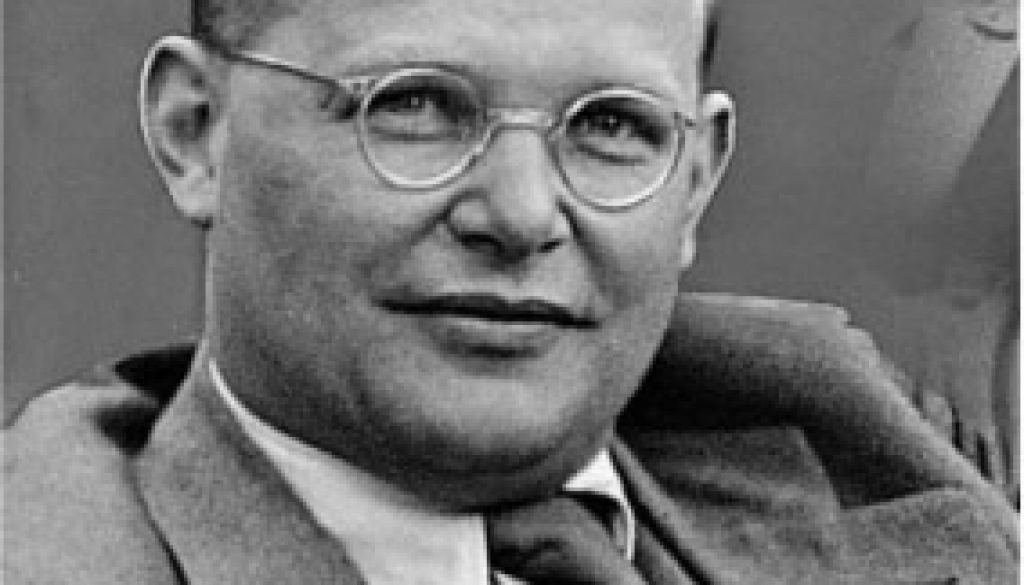Dietrich Bonhoeffer: no more cheap grace
The Grab a Towel book states that servant leaders are ‘deep well’ leaders who catalyse other leaders through growing in maturity. The book argues that our effectiveness as leaders will be directly proportional to the depth of our relationship with Christ.
Dietrich Bonhoeffer serves as a great example of a deep well leader.
On April 9th 1945, 23 days before the Nazis’ surrender and the end of the Second World War, Hitler’s orders to hang Dietrich Bonhoeffer were carried out. Bonhoeffer had been imprisoned for almost exactly two years. His legacy, however, is not just as an opponent to Nazism through involvement in the active resistance to Hitler’s evil regime, but is primarily as a preeminent theologian and humble Christ-centred servant leader. He was a ‘deep-well’ leader… combining depth of theological insight together with fruitful ministry… the fruit of which has extended into the century beyond his physical life.
One of Bonhoeffer’s most influential works is the Cost of Discipleship[i] whereby he outlines his understanding of the true nature of Christian discipleship. Bonhoeffer understood the Christian life not as simply a shallow adherence to a religious code. He defined shallowness through the term ‘cheap grace’… which ‘is the preaching of forgiveness without requiring repentance, baptism without church discipline, communion without confession, absolution without personal confession. Cheap grace is grace without the cross, grace without Jesus Christ, living and incarnate’. Bonhoeffer argued passionately that true faith is a faith that counts the cost of discipleship and results in fruitful Christian living, whereas cheap grace results in a shallow faith and an unfruitful life. ‘The word of cheap grace has been the ruin of more Christians than any commandment of works’.
The antithesis to cheap grace is costly grace. I’m certain that Dietrich Bonhoeffer would draw the correlation between being a deep-well servant leader and his concept of costly grace. Servant leaders are first and foremost followers of Christ and this must extend to every sphere of their life. Bonhoeffer demonstrates the intrinsic relationship between his concept of costly grace and our mandate to follow the example of Christ when he wrote:
‘Such grace is costly because it calls us to follow, and it is grace because it calls us to follow Jesus Christ. It is costly because it costs a man his life, and it is grace because it gives a man the only true life. It is costly because it condemns sin, and grace because it justifies the sinner. Above all, it is costly because it cost God the life of his Son: ‘ye were bought at a price’, and what has cost God much cannot be cheap for us. Above all, it is grace because God did not reckon his Son too dear a price to pay for our life, but delivered him up for us. Costly grace is the Incarnation of God.’
Bonhoeffer was to live out the reality of costly grace as he stood for truth, as part of the Confessing Church in political opposition to Hitler. This would cost him his reputation (being banned from public speaking and visiting Berlin), his liberty (being imprisoned in April 1943), and ultimately his life.
Dietrich Bonhoeffer was a deep well servant leader who stood firm to the end and faced his premature death with incredible peace and poise. He was executed by the Nazis on April 9th 1945, just 23 days before their surrender to the allied forces. Bonhoeffer demonstrated his assurance in his last recorded words to Payne Best, a fellow prisoner. He said, ‘This is the end – for me the beginning of life.’ His execution was witnessed by the camp doctor who shared this of Bonhoeffer:
The camp doctor who witnessed the execution wrote: ‘I saw Pastor Bonhoeffer … kneeling on the floor praying fervently to God. I was most deeply moved by the way this lovable man prayed, so devout and so certain that God heard his prayer. At the place of execution, he again said a short prayer and then climbed the few steps to the gallows, brave and composed. His death ensued after a few seconds. In the almost fifty years that I worked as a doctor, I have hardly ever seen a man die so entirely submissive to the will of God.’[ii]
What are some of the keys we can discern from Bonhoeffer’s ministry philosophy that enabled him to be a deep well servant leader that stood firm unto the end – under extremely oppressive conditions?
Firstly, he was a man who deeply immersed himself in the Bible. He said, ‘Everyday in which I do not penetrate more deeply into the knowledge of God’s Word is a lost day for me.’
Secondly, he understood what it meant to truly be a follower of Christ; ‘When Christ calls a man, he bids him come and die’. Costly grace was not merely a philosophical concept, but a daily reality that shaped his entire approach to this life.
Thirdly, he had a Kingdom perspective that formed his attitude to life on earth. He wrote, ‘Christians live like other men, they mourn and rejoice, they buy their requirements and use the world for the purpose of day to day existence. But they have everything through Christ alone, in him and for his sake. Thus they are not bound by it. They have everything as though they have it not’. In other words, Bonhoeffer sought to live in this world but was not of this world… which meant he could depart from this world knowing that his life was not over, in fact, it was just the beginning of life.
Finally, he was devoted to Jesus. Consider this incredible statement: ‘Our hearts have room only for one all-embracing devotion, and we can only cleave to one Lord. Every competitor to that devotion must be hated’. Some may deem this fanatical in the extreme – and yet it is nothing more than taking Christ at His word who said, ‘If anyone comes to me and does not hate father and mother, wife and children, brothers and sisters—yes, even their own life—such a person cannot be my disciple’ (Luke 14:26).
Some may say this is ‘deep stuff’… and yet it can be the normal experience of all Christians who are determined to follow the example of Jesus and live a life of faith and fruitfulness. It is the life of someone who grabs a towel and commits to become a deep-well, Christ-centred, servant leader.
[i] All quotes from Dietrich Bonhoeffer, The Cost of Discipleship. Click here for more information.
[ii] Eberhard Bethge, Dietrich Bonhoeffer: A Biography, p.927





January 18, 2019 @ 9:07 am
Powerful stuff! Grace that costs, and yet is worth more than we will ever pay, like that pearl of great price (Matt 13:45-46). This kind of all-embracing devotion will cost us everything, and yet leave us possessing everything, rejoicing over the treasure we have found. Lord help us to live this kind of wholehearted abandon to You!